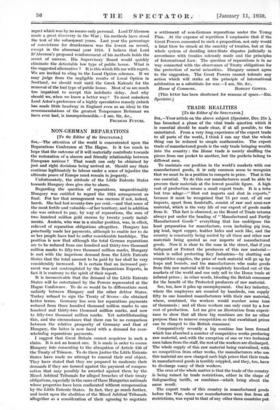NON-GERMAN REPARATIONS
[To the Editor of the SPECTATOR.] Sm,—The attention of the world is concentrated upon the Reparations Conference at The Hague. Is it too much to hope that the outcome of it will materially contribute towards the restoration of a sincere and friendly relationship between European nations ? That result can only be obtained by just and right decisions being arrived at. Should any State continue legitimately to labour under a sense of injustice the ultimate peace of Europe must remain in jeopardy.
Unfortunately, the attitude of the Little Entente States towards Hungary does give rise to alarm.
Regarding the question of reparations, unquestionably Hungary was entitled to regard the 1924 arrangement as final. For her that arrangement was onerous if not, indeed, harsh. She had lost seventy-two per cent.—and that some of the most fertile and valuable—of her territory, and in addition she was ordered to pay, by way of reparations, the sum of two hundred million gold crowns by twenty yearly in.stal- menti. Austria, who was in a 'shuffle position, was, in effect, relieved of reparation obligations altogether. Hungary has punctually made her payments, although to enable her to do so her people have had to suffer considerable hardships. The position is now that although the total German reparations are to be reduced from one hundred and thirty-two thousand million marks to fifty-two thousand million marks, Hungary Is met with the imperious demand from the Little Entente StateS that the total amount to be paid by her shall be very considerably increased. It is certain that an increased pay- ment was not contemplated by the Reparations Experts, in fact it is contrary to the spirit of their report.
It is inconceivable that the demand of the Little Entente States will be entertained by the Powers represented at the Hague Conference. To do so would be to differentiate most unfairly between Hungary and the other debtor States. Turkey refused to sign the Treaty of Sevres—she obtained better terms. Germany has seen her reparations payments reduced from three hundred thousand million marks to one hundred and thirty-two thousand million marks, and now to fifty-two thousand million marks. Yet notwithstanding -this, and the circumstance that there can be no comparison between the relative prosperity of Germany and that of Hungary, the latter Is now faced with a demand for over- whehnhig reparations payments.
I 'suggest that Great Britain cannot acquiesce in such a claim. It is not an honest one. It is made in order to coerce Hungary into consenting to the- abrogation of Article 250 of the Treaty of Trianon. To do thetas justice the Little Entente States have made no attempt to conceal their real object. They have stated that they are prepared to moderate their demands if they are insured against the payment of compen- sation that may possibly be awarded against them by the Mixed Arbitral Tribunals for alleged breaches of their treaty obligations, especially in the cases of those Hungarian nationals whose properties have been confiscated without compensation by the Little Entente States. In fact, they go much further, and insist upon the abolition of the Mixed Arbitral Tribunals altogether as a consideration of their agreeing to negotiate
a settlement of non-German reparations under the ;Young Plan. At the expense of repetition I emphasize that if the Great Powers consented to such a proposition, not only would a fatal blow be struck at the sanctity of treaties, but at the whole system of deciding inter-State disputes judicially in accordance with treaties solemnly made and the principles of International Law. The question of reparations is in no way connected with the observance of Treaty obligations for the protection of racial minorities. Hungary cannot agree to the suggestion. The Great Powers cannot tolerate any action which will strike at the principle of international arbitration as a substitute for war.—I am, Sir, &c., [This letter has been shortened for reasons of space.—En. Spectator.]






































 Previous page
Previous page